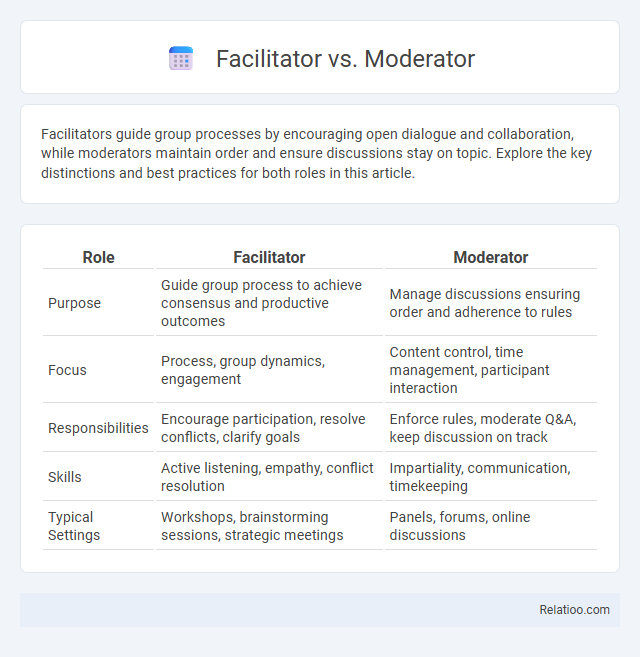Facilitators guide group processes by encouraging open dialogue and collaboration, while moderators maintain order and ensure discussions stay on topic. Explore the key distinctions and best practices for both roles in this article.
Table of Comparison
| Role | Facilitator | Moderator |
|---|---|---|
| Purpose | Guide group process to achieve consensus and productive outcomes | Manage discussions ensuring order and adherence to rules |
| Focus | Process, group dynamics, engagement | Content control, time management, participant interaction |
| Responsibilities | Encourage participation, resolve conflicts, clarify goals | Enforce rules, moderate Q&A, keep discussion on track |
| Skills | Active listening, empathy, conflict resolution | Impartiality, communication, timekeeping |
| Typical Settings | Workshops, brainstorming sessions, strategic meetings | Panels, forums, online discussions |
Introduction: Defining Facilitator and Moderator
A facilitator guides group discussions and activities to ensure productive collaboration and achieve specific goals, while a moderator oversees conversations to maintain order and neutrality, often in debates or panels. Your role as a facilitator involves actively encouraging participation and managing group dynamics, whereas a moderator primarily enforces rules and time limits without influencing content. Understanding these distinctions is crucial for selecting the right approach in meetings, workshops, or events.
Core Responsibilities of a Facilitator
A facilitator's core responsibility is to guide group discussions and ensure all participants contribute effectively, fostering collaboration and achieving collective goals. Unlike moderators who primarily manage the flow of conversation and enforce rules, facilitators actively shape the process by encouraging diverse perspectives and resolving conflicts. Your role as a facilitator involves creating an inclusive environment that promotes understanding and drives decision-making without imposing personal opinions.
Key Roles of a Moderator
A moderator primarily ensures smooth communication during discussions by guiding conversation flow, managing participant interactions, and maintaining focus on the topic. Key roles include enforcing rules, preventing dominance by any individual, and resolving conflicts to create an inclusive environment. Unlike facilitators who foster group collaboration and trainers who provide expertise, moderators emphasize neutrality and structure to optimize productive dialogue.
Skills Required for Facilitation
Effective facilitation requires a unique set of skills including active listening, conflict resolution, and the ability to guide group dynamics without dominating the conversation. Unlike moderators who focus on enforcing rules and managing time, facilitators need emotional intelligence and adaptability to encourage participation and foster collaboration among diverse group members. Your success as a facilitator depends on mastering these skills to create an inclusive environment where all voices are heard and productive outcomes are achieved.
Essential Abilities for Moderation
Effective moderation requires strong communication skills, active listening, and impartiality to guide discussions objectively. Unlike facilitators who primarily focus on fostering collaboration and facilitators who drive the process, moderators must enforce rules and manage conflicts to maintain a constructive environment. Essential abilities for moderation also include quick decision-making, conflict resolution, and ensuring equal participation among all attendees.
Facilitator vs Moderator: Main Differences
Facilitators guide group processes by encouraging participation and collaboration, focusing on the group's overall dynamics and problem-solving. Moderators primarily manage discussions or debates to ensure balanced participation and adherence to rules or agendas. The main differences lie in the facilitator's role to foster creativity and consensus, while moderators maintain order and structure during conversations.
Situations Best Suited for Facilitators
Facilitators excel in situations requiring collaborative problem-solving, creative brainstorming, and consensus-building among diverse groups. Your team benefits most when navigating complex decisions or fostering open communication, as facilitators guide discussions impartially to achieve shared goals. Unlike moderators or mediators, facilitators are best suited to environments emphasizing active participation and collective ownership of outcomes.
When to Choose a Moderator
Choose a moderator when managing discussions that require impartial guidance to balance diverse viewpoints and maintain focus on agenda objectives. Moderators excel in environments where conflict resolution and equal participation are critical, such as panels, debates, or group decision-making sessions. Unlike facilitators, who drive collaboration and process engagement, moderators prioritize neutrality and structure to ensure fair and orderly communication.
Overlapping Competencies and Collaboration
Facilitators, moderators, and coordinators share overlapping competencies such as active listening, conflict resolution, and clear communication, enabling smooth group interactions and decision-making. Your effective collaboration with these roles hinges on understanding their nuanced differences: facilitators guide the process, moderators manage discussions impartially, and coordinators handle logistics. Leveraging their complementary skills fosters a cohesive environment that drives productive outcomes and ensures balanced participation among stakeholders.
Conclusion: Selecting the Right Role
Choosing the right role depends on the context and desired outcome; a facilitator guides group processes to encourage collaboration, a moderator manages discussions to ensure balanced participation and adherence to rules, while a chairperson or facilitator leads meetings with a focus on structure and decision-making. Understanding the nuances between these roles enhances group dynamics and effectiveness by aligning responsibilities with specific goals. Selecting the appropriate role maximizes productivity, maintains order, and fosters an inclusive environment tailored to the situation's needs.

Infographic: Facilitator vs Moderator
 relatioo.com
relatioo.com